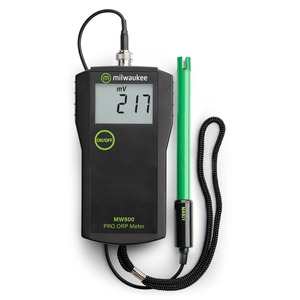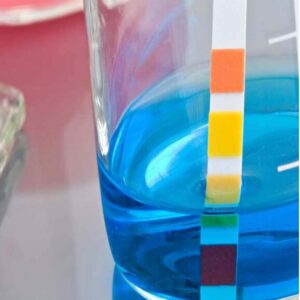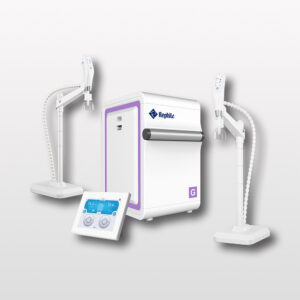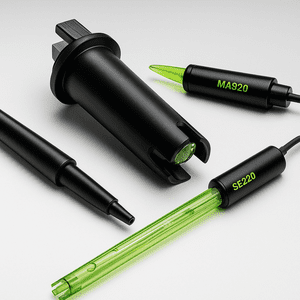
Care, Maintenance and Storage of your Meters and Electrodes
Interlab supplies a wide range of Meters and Electrodes for a wide range of uses. View our extensive range here.
If you are not familiar with the Care and use of these instruments, you have landed on the right page. To ensure a quick response and free – flowing liquid junction, the sensing element and reference junction must not be allowed to dry out.
CARE AND USE
pH meters usually start performing poorly because of problems with the probe. The two parts of the pH probe that cause problems are the glass sensing bulb and the reference junction.
SENSING BULB
The glass bulb loses sensitivity with use and will eventually fail. This is true of all pH probes.
REFERENCE JUNCTION
The reference junction is a small hole that allows the meter to compare the sample to a reference. The reading is generated based on the electrical difference between the sample and reference. If the junction hole gets clogged, the pH electrode will no longer function.
You can extend the life of your pH electrode in the following ways:
STORAGE
 The pH probe needs to be kept hydrated. Long periods of dry storage will damage the sensitivity of the probe. Allowing the probe to dry out may also result in the junction hole getting clogged.
The pH probe needs to be kept hydrated. Long periods of dry storage will damage the sensitivity of the probe. Allowing the probe to dry out may also result in the junction hole getting clogged.
Storing in pH probe storage solution or pH calibration buffers will help address both these issues. Do not store in tap water and DI water. This will damage the sensitivity of the probe.
The best way to store the probe is with the probe’s cap filled with storage solution or calibration buffer and the cap tightened to prevent leakage. It is also recommended that to store the electrode upright to further reduce the potential for leakage.
CLEANING
Residue from the sample can impact the sensitivity of the sensing bulb and clog the junction. This is especially true if the sample has a lot of organic material. We recommend regularly soaking your electrode in cleaning solution MA9016.
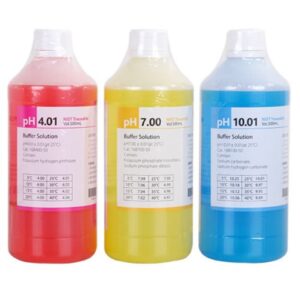 The pH sensing bulbs become less sensitive over time so make sure that you are calibrating regularly to keep your PRO Plus pH meter accurate. Also, calibrate after cleaning or a long period of storage.
The pH sensing bulbs become less sensitive over time so make sure that you are calibrating regularly to keep your PRO Plus pH meter accurate. Also, calibrate after cleaning or a long period of storage.
The pH electrode, due to the nature of its construction, needs to be kept moist at all times. In order to operate properly, glass needs to be hydrated. Hydration is required for the ion exchange process to occur. If an electrode should become dry, it is best to place it in some tap water for half an hour to condition the glass. pH electrodes are like batteries; they run down with time and use. As an electrode ages, its glass changes resistance. This resistance change alters the electrode potential. For this reason, electrodes need to be calibrated on a regular basis. Calibration in pH buffer solution corrects for this change. Calibration of any pH equipment should always begin with buffer 7.0 as this is the “zero point.” The pH scale has an equivalent mV scale. The mV scale ranges from +420 to -420 mV. At a pH of 7.0 the mV value is 0. Each pH change corresponds to a change of approx. ±60 mV. As pH values become more acidic the mV values become greater. pH electrodes have junctions which allow the internal electrolyte solution of the measuring electrode to leak out into the solution being measured.
This junction can become clogged by particulates in the solution and can also facilitate poisoning by metal ions present in the solution. If a clogged junction is suspected it is best to soak the electrode in tap water to dissolve the material and clear the junction. When not in use it is best to store the electrode in either buffer 4.0 or buffer 7.0. Never store an electrode in distilled or deionized water as this will cause migration of the electrolyte solution from the electrode. How long a pH electrode will last will depend on how it is cared for and the solutions it is used to measure. Typically, a gel-filled combination pH electrode will last six months to 1 year depending on the care and application. How long an electrode will last is determined by how well the probe is maintained and the pH application. The harsher the system, the shorter the lifespan. For this reason it is always a good idea to have a back-up electrode on hand to avoid any system down time. Calibration is also an important part of electrode maintenance. This assures not only that the electrode is behaving properly but that the system is operating correctly
Information Supplied Courtesy of Milwaukee
Contact us for more information
For more information about Care and Maintenance, get in touch with Interlab today! order though our online system right here. You can also order via sales@interlab.co.nz or just give us a FREE call on 0508 331 331.
